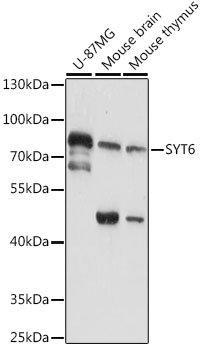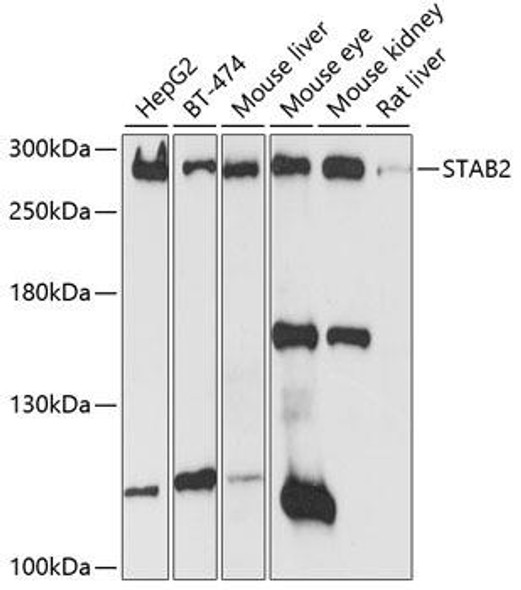Anti-SYT6 Antibody (CAB16171)
- SKU:
- CAB16171
- Product type:
- Antibody
- Reactivity:
- Human
- Mouse
- Rat
- Host Species:
- Rabbit
- Isotype:
- IgG
- Antibody Type:
- Polyclonal Antibody
- Research Area:
- Cell Biology
Frequently bought together:
Description
| Antibody Name: | Anti-SYT6 Antibody |
| Antibody SKU: | CAB16171 |
| Antibody Size: | 20uL, 50uL, 100uL |
| Application: | WB |
| Reactivity: | Human, Mouse, Rat |
| Host Species: | Rabbit |
| Immunogen: | Recombinant fusion protein containing a sequence corresponding to amino acids 1-120 of human SYT6 (NP_001257734.1). |
| Application: | WB |
| Recommended Dilution: | WB 1:500 - 1:2000 |
| Reactivity: | Human, Mouse, Rat |
| Positive Samples: | U-87MG, Mouse brain, Mouse thymus |
| Immunogen: | Recombinant fusion protein containing a sequence corresponding to amino acids 1-120 of human SYT6 (NP_001257734.1). |
| Purification Method: | Affinity purification |
| Storage Buffer: | Store at -20°C. Avoid freeze / thaw cycles. Buffer: PBS with 0.02% sodium azide, 50% glycerol, pH7.3. |
| Isotype: | IgG |
| Sequence: | MPWR NKEA SSPS SANP PLEA LQSP SFRG NMAD KLKD PSTL GFLE AAVK ISHT SPDI PAEV QMSV KEHI MRHT RLQR QTTE PASS TRHT SFKR HLPR QMHV SSVD YGNE LPPA AEQP TSIG |
| Gene ID: | 148281 |
| Uniprot: | Q5T7P8 |
| Cellular Location: | Cell membrane, Cytoplasm, Cytoplasmic vesicle, Membrane, Peripheral membrane protein, Single-pass membrane protein, Single-pass membrane protein, cytosol, secretory vesicle, synaptic vesicle membrane |
| Calculated MW: | 48kDa/57kDa |
| Observed MW: | 85kDa |
| Synonyms: | SYT6, sytVI |
| Background: | The protein encoded by this gene belongs to the synaptotagmin family. Synaptotagmins share a common domain structure that includes a transmembrane domain and a cytoplasmic region composed of 2 C2 domains, and are involved in calcium-dependent exocytosis of synaptic vesicles. This protein has been shown to be a key component of the secretory machinery involved in acrosomal exocytosis. Alternatively spliced transcript variants have been found for this gene. |
| UniProt Protein Function: | SYT6: May be involved in Ca(2+)-dependent exocytosis of secretory vesicles through Ca(2+) and phospholipid binding to the C2 domain or may serve as Ca(2+) sensors in the process of vesicular trafficking and exocytosis. May mediate Ca(2+)- regulation of exocytosis in acrosomal reaction in sperm. Belongs to the synaptotagmin family. 2 isoforms of the human protein are produced by alternative splicing. |
| UniProt Protein Details: | Protein type:Membrane protein, integral; Vesicle Chromosomal Location of Human Ortholog: 1p13.2 Cellular Component: cytosol; extrinsic to membrane; integral to membrane; plasma membrane Molecular Function:calcium ion binding; calcium-dependent phospholipid binding; clathrin binding; protein homodimerization activity; syntaxin binding Biological Process: calcium ion-dependent exocytosis of neurotransmitter; regulation of calcium ion-dependent exocytosis; vesicle fusion |
| NCBI Summary: | The protein encoded by this gene belongs to the synaptotagmin family. Synaptotagmins share a common domain structure that includes a transmembrane domain and a cytoplasmic region composed of 2 C2 domains, and are involved in calcium-dependent exocytosis of synaptic vesicles. This protein has been shown to be a key component of the secretory machinery involved in acrosomal exocytosis. Alternatively spliced transcript variants have been found for this gene. [provided by RefSeq, Dec 2011] |
| UniProt Code: | Q5T7P8 |
| NCBI GenInfo Identifier: | 209572719 |
| NCBI Gene ID: | 148281 |
| NCBI Accession: | Q5T7P8.3 |
| UniProt Secondary Accession: | Q5T7P8,B1AMB8, B3KPK1, |
| UniProt Related Accession: | Q5T7P8 |
| Molecular Weight: | 48,442 Da |
| NCBI Full Name: | Synaptotagmin-6 |
| NCBI Synonym Full Names: | synaptotagmin 6 |
| NCBI Official Symbol: | SYT6 |
| NCBI Official Synonym Symbols: | sytVI |
| NCBI Protein Information: | synaptotagmin-6 |
| UniProt Protein Name: | Synaptotagmin-6 |
| UniProt Synonym Protein Names: | Synaptotagmin VI; SytVI |
| Protein Family: | Synaptotagmin |
| UniProt Gene Name: | SYT6 |
| UniProt Entry Name: | SYT6_HUMAN |








